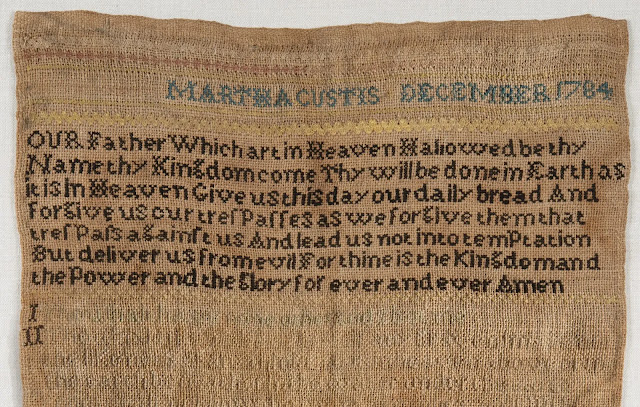Samuel Adams: 'the last of the Puritans'
Samuel Adams was a complex man - he's been called a revolutionary, a publican, a politician, a patriot, a Calvinist, a Psalm-singer and the last of the Puritans.
As a Christian, I believe God uses events in a person's life to equip them for service. Let's take a quick look at the formative years of Mr. Adams life and how the Christian faith influenced his character and activism.
The Samuel Adams Heritage Society writes that Samuel's father was "a deacon of the Congregational Church, a businessman and a politician. Sam was born in a prominent and wealthy family that had high expectations of him. Both parents were strict puritans; his mother was a very religious woman who supported the narrow Calvinist faith movement. As a result his family’s religious beliefs played an important role in their son’s education."His parents wanted him to become a minister of the church but he was not very interested in pursuing that path, he was interested in politics which became his passion in life. The influence of his religious upraising was felt in every decision that he took as a politician, he was known as a religious man and later called 'the last of the Puritans.'"The biography at the Samuel Adams Heritage Society also tells that "In 1749 SA married his pastor’s daughter, Elizabeth Checkley. Together they had 6 children of which only two survived; Samuel and Hannah. In 1757 he lost his wife and seven years later he married Elizabeth Wells with whom he had no children."
You can learn more about Samuel and Elizabeth (Wells) marriage here: Elizabeth Wells Adams | History of American Women (womenhistoryblog.com).
Please read more here: Samuel Adams Heritage Society (samuel-adams-heritage.com)
I also found this interesting information posted online at Boston 1775:
Published
FRIDAY, AUGUST 11, 2006
"Probably the most delightfully cranky and gossipy account of the political disputes in Boston is Peter Oliver's 'Origin and Progress of the American Revolution': A Tory View. Oliver was the last royal Chief Justice of Massachusetts, brother of the second-to-last royal Lieutenant Governor, and related by marriage to second-to-last royal governor, Thomas Hutchinson. Among Oliver's complaints about Adams was that he
had a good Voice, & was a Master in vocal Musick. This Genius he improved, by instituting singing Societys of Mechanicks [i.e., craftsmen], where he presided; & embraced such Opportunities to ye inculcating Sedition.
Later in his account, Oliver refers to 'Mr. Saml. Adams’s Psalm-singing Myrmidons.' (Myrmidons were fierce warriors in the Trojan War; out of that context, the word was an educated way of saying 'thugs.')
"John Mein, the printer who first published the 'Samuel the Publican' insult, followed up by saying Adams was 'noted for Psalm singing, & leader of the Band at Checkleys Meeting'—i.e., the Rev. Samuel Checkley's congregation at the New South Meeting-House. (Adams's first wife was Checkley's daughter.) John Fleeming, Mein's business partner, referred to Adams as 'the psalm-singer' in the letter to Dr. Benjamin Church, Jr., that led to that doctor's exposure as a British agent in 1775.
"In sum, the friends of the royal government agreed that Adams liked to sing psalms in church, and recruited working-men to the Whigs during choir rehearsals. That fits with Adams's conservative religious beliefs, which I've mentioned before. But it sure doesn't fit with our image of revolutionaries in taverns."
Copyright © 2006-23 by J. L. Bell
"John Mein, the printer who first published the 'Samuel the Publican' insult, followed up by saying Adams was 'noted for Psalm singing, & leader of the Band at Checkleys Meeting'—i.e., the Rev. Samuel Checkley's congregation at the New South Meeting-House. (Adams's first wife was Checkley's daughter.) John Fleeming, Mein's business partner, referred to Adams as 'the psalm-singer' in the letter to Dr. Benjamin Church, Jr., that led to that doctor's exposure as a British agent in 1775.
"In sum, the friends of the royal government agreed that Adams liked to sing psalms in church, and recruited working-men to the Whigs during choir rehearsals. That fits with Adams's conservative religious beliefs, which I've mentioned before. But it sure doesn't fit with our image of revolutionaries in taverns."
~~~~~~~~~~~~~~~~~~~~~~~~~~~~~~~
In conclusion, Samuel Adams was the man God made and used for His glory at that needful time in American history - our war for Independence.
May his name always be revered and remembered by his posterity.
If ye love wealth greater than liberty, the tranquility of servitude greater than the animating contest for freedom, go home from us in peace. We seek not your counsel, nor your arms. Crouch down and lick the hand that feeds you; May your chains set lightly upon you, and may posterity forget that ye were our countrymen. ~ Samuel Adams, From a speech delivered at the State House in Philadelphia on August 1, 1776.






Comments
Post a Comment
Welcome! Please feel free to comment, but anti-Christian comments or profanity will not be tolerated. Thank you, ed.